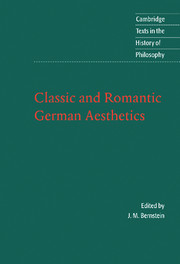Book contents
- Frontmatter
- Contents
- Introduction
- Chronology
- Further reading
- Note on the texts
- Aesthetica in nuce: A Rhapsody in Cabbalistic Prose (1762)
- Laocoön: An Essay on the Limits of Painting and Poetry (1766)
- From ‘On the Artistic Imitation of the Beautiful’ (1788)
- ‘Kallias or Concerning Beauty : Letters to Gottfried Körner’ (1793)
- ‘Oldest Programme for a System of German Idealism’ (1796)
- ‘Letter to Hegel, 26 January 1795’
- ‘Being Judgement Possibility’ (1795)
- ‘The Significance of Tragedy’ (1802)
- ‘Remarks on Oedipus’ (1803)
- From Miscellaneous Remarks (1797)
- ‘Monologue’
- ‘Dialogues’ (1798)
- ‘On Goethe’ (1798)
- ‘Studies in the Visual Arts’ (1799)
- From ‘Critical Fragments’ (1797)
- From ‘Athenaeum Fragments’ (1798)
- From ‘Ideas’ (1800)
- ‘On Goethe's Meister’ (1798)
- ‘Letter About the Novel’ (1799)
- ‘On Incomprehensibility’ (1800)
- Index
- Cambridge texts in the history of philosophy
From ‘Ideas’ (1800)
Published online by Cambridge University Press: 05 June 2012
- Frontmatter
- Contents
- Introduction
- Chronology
- Further reading
- Note on the texts
- Aesthetica in nuce: A Rhapsody in Cabbalistic Prose (1762)
- Laocoön: An Essay on the Limits of Painting and Poetry (1766)
- From ‘On the Artistic Imitation of the Beautiful’ (1788)
- ‘Kallias or Concerning Beauty : Letters to Gottfried Körner’ (1793)
- ‘Oldest Programme for a System of German Idealism’ (1796)
- ‘Letter to Hegel, 26 January 1795’
- ‘Being Judgement Possibility’ (1795)
- ‘The Significance of Tragedy’ (1802)
- ‘Remarks on Oedipus’ (1803)
- From Miscellaneous Remarks (1797)
- ‘Monologue’
- ‘Dialogues’ (1798)
- ‘On Goethe’ (1798)
- ‘Studies in the Visual Arts’ (1799)
- From ‘Critical Fragments’ (1797)
- From ‘Athenaeum Fragments’ (1798)
- From ‘Ideas’ (1800)
- ‘On Goethe's Meister’ (1798)
- ‘Letter About the Novel’ (1799)
- ‘On Incomprehensibility’ (1800)
- Index
- Cambridge texts in the history of philosophy
Summary
5. The mind understands something only in so far as it absorbs it like a seed into itself, nurtures it and lets it grow into blossom and fruit. Therefore scatter holy seed into the soil of the spirit, without any affectation and any added superfluities.
8. The mind, says the author of the Talks on Religion, can understand only the universe. Let imagination take over and you will have a God. Quite right: for the imagination is man's faculty for perceiving divinity.
11. Only through religion does logic become philosophy; only from it comes everything that makes philosophy greater than science. And instead of an eternally rich, infinite poetry, the lack of religion gives us only novels or the triviality that now is called art.
13. Only someone who has his own religion, his own original way of looking at infinity, can be an artist.
15. Every particular conception of God is mere gossip. But the idea of God is the Idea of ideas.
16. The priest as such exists only in the invisible world. In what guise is it possible for him to appear among men? His only purpose on earth will be to transform the finite into the infinite; hence he must be and continue to be, no matter what the name of his profession, an artist.
19. To have genius is the natural state of humanity. Nature endowed even humanity with health, and since love is for women what genius is for men, we must conceive of the golden age as a time when love and genius were universal.
- Type
- Chapter
- Information
- Classic and Romantic German Aesthetics , pp. 261 - 268Publisher: Cambridge University PressPrint publication year: 2002
- 1
- Cited by

